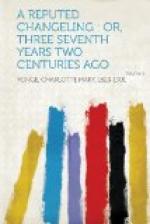When grace had been pronounced by the chaplain the lady withdrew to her parlour, the two boys, each with an obeisance and request for permission, departed for an hour’s recreation, and Dr. Woodford intimated that he wished for some conversation with his host respecting the boy Peregrine.
“Let us discuss it here,” said Major Oakshott, turning towards a small table set in the deep bay window, and garnished with wine, fruit, and long slender glasses. “Good Mr. Horncastle,” he added, as he motioned his guest to one of the four seats, “is with me in all that concerns my children, and I desire my brother’s counsel respecting the untoward lad with whom it has pleased Heaven to afflict me.”
When the glasses had been filled with claret Dr. Woodford uttered a diplomatic compliment on the healthful and robust appearance of the eldest and youngest sons, and asked whether any cause had been assigned for the difference between them and the intermediate brother.
“None, sir,” returned the father with a sigh, “save the will of the Almighty to visit us for our sins with a son who has thus far shown himself one of the marred vessels doomed to be broken by the potter. It may be in order to humble me and prove me that this hath been laid upon me.”
The chaplain groaned acquiescence, but there was vexation in the brother’s face.
“Sir,” said the Doctor, “it is my opinion and that of my sister-in-law, an excellent, discreet, and devout woman, that the poor child would give you more cause for hope if the belief had not become fixed in his mind that he is really and truly a fairy elf—yes, in very sooth—a changeling!”
All the auditors broke out into exclamations that it was impossible that a boy of fourteen could entertain so absurd an idea, and the tutor evidently thought it a fresh proof of depravity that he should thus have tried to deceive his kind hosts.
In proof that Peregrine veritably believed it himself, Dr. Woodford related what he had witnessed on Midsummer night, mentioning how in delirium the boy had evidently believed himself in fairyland, and how disappointed he had been, on regaining his senses, to find himself on common earth; telling also of the adventure with the King, which Sir Christopher Wren had described to him, but of which Major Oakshott was unaware, though it explained the offer of the pageship. He was a good deal struck by these revelations, proving misery that he had never suspected, though, as he said, he had often pleaded, “Why will ye revolt more and more? ye will be stricken more and more.”
“Have you ever sought his confidence?” asked the travelled brother, a question evidently scarcely understood, for the reply was, “I have always required of my sons to speak the truth, nor have they failed of late years save this unfortunate Peregrine.”
“And,” said Sir Peregrine, “if the unlucky lad actually supposes himself to be no human being, admonitions and chastisements would naturally be vain.”




